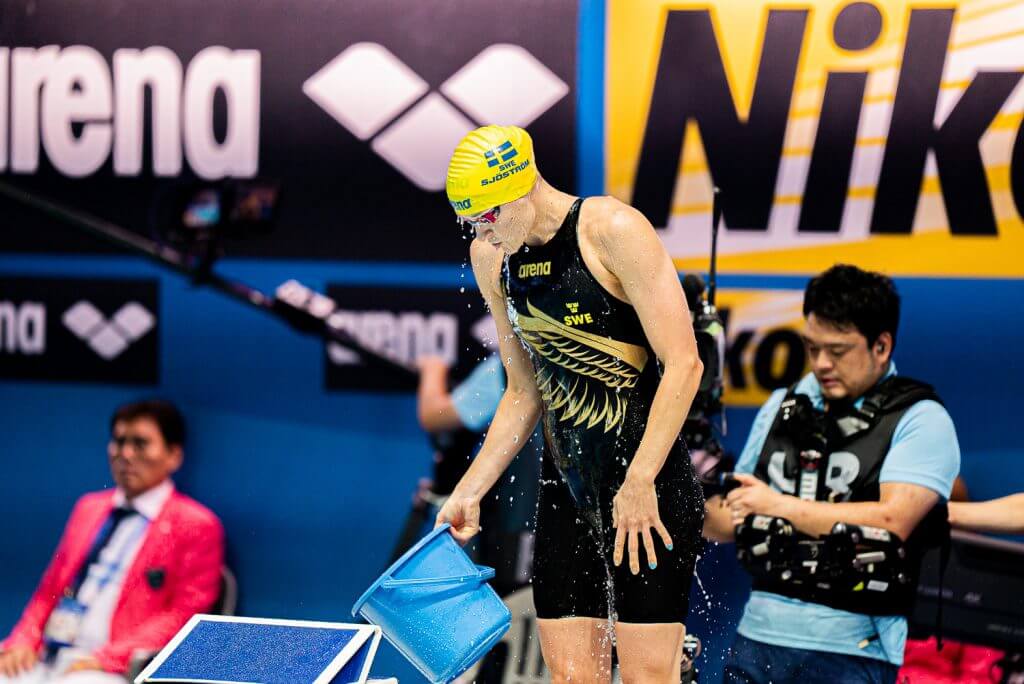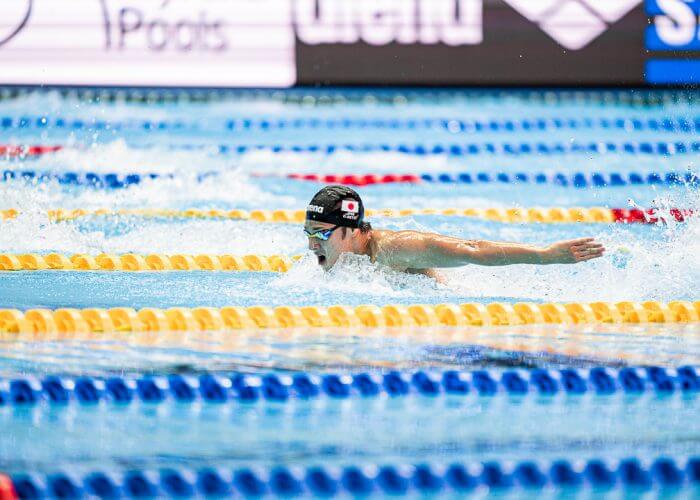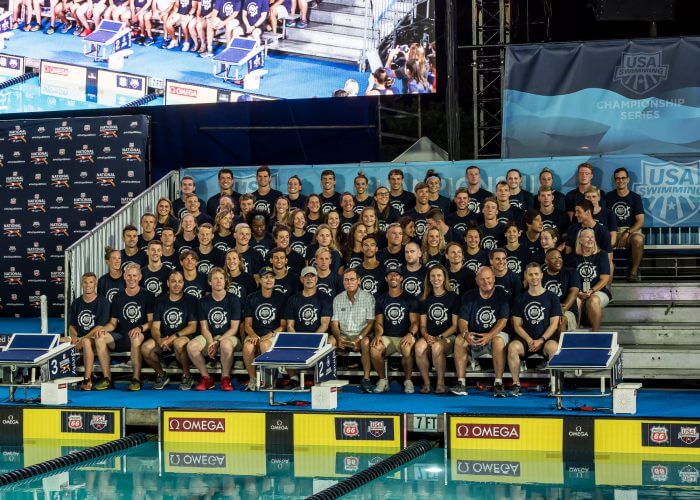Commentary: The Pros & Cons of Selecting an Olympic Team So Far in Advance

Editorial content for the 2021 Tokyo Olympic Games coverage is sponsored by GMX7.
See full event coverage. Follow GMX7 on Instagram at @GMX7training #gmx7

A couple days ago, the Swedish Olympic Federation announced it was adding six athletes to its Olympic team for Tokyo this summer with swimmers Louise Hansson and Erik Persson on that early entry list. Both of them will be making their second appearances in the Olympic Games and will join Sarah Sjostrom on the team that is set in place to go to Japan to fight for Olympic glory.
Sweden likely selected those three swimmers well in advance to represent the country in Tokyo because of their success in 2019 as all three of them reached an individual final in at least one Olympic event at the World Championships in July. Sjostrom collected medals in the 50, 100, 200 free and 100 fly, Persson was eighth in the 200 breast, and Hansson was seventh in the 100 fly.
Sweden was going to select its Olympic team at the Swedish Open in April, which would have been two weeks after NCAAs for Hansson, who is currently in her senior year at the University of Southern California in Los Angeles. Other countries like Poland and Denmark will be selecting their Olympic teams at that Swedish Open as the athletes will need to get under the FINA A standard unless otherwise noted by the national federation.
That leaves a pretty cutthroat system to try to make dreams come true of becoming an Olympic athlete. Especially if an athlete falls ill during the meet and cannot perform up to their best when they would have otherwise gone under the time if the meet fell on a different weekend. Of course exceptions are sometimes made in these cases with some countries giving an incentive for swimmers in 2019 that if they can win a medal at the World Championships the year before, then they will be guaranteed a spot on the Olympic team the next year so they can train through the Trials and be at 100% for the Games and ultimately win medals.
This process isn’t 100% effective for every country. It works in some cases and in other instances it does not.
The Positives of Selecting an Olympic Team in Advance
Ability to Put 100% Focus on the End Goal

Daiya Seto has already qualified for Tokyo by winning the 200 IM and 400 IM at the 2019 World Championships – Photo Courtesy: Becca Wyant
There’s a handful of swimmers that have already solidified their selection for the Tokyo Games including Japan’s Daiya Seto, who will be a huge crowd favorite in the 200 and 400 IM and any other events he qualifies in. He is the only Japanese swimmer already on the team because of the two gold medals he won at the 2019 World Championships, allowing him to not have to necessarily fully rest for the Japanese Trials in April. Seto will be able to train this entire year knowing he has already qualified for Tokyo, so he will not have to be stressed out when he swims at the Olympic Trials thinking “what if the meet doesn’t go my way?”
Japan wants to send the best possible team to Tokyo, and especially with a home Olympics, it wants to put on the best possible show for the rest of the world. Seto is one of the gold medal hopes for the country and the federation likely doesn’t want to jeopardize his spot in the Games.
The Ukraine has also pre-selected 1500 free Worlds silver medalist Mykhailo Romanchuk as well as Worlds finalist Denys Kesyl and World juniors champion Vladyslav Bukhov for Tokyo. Rather than try to qualify at the European Championships or another domestic meet, the Ukraine has six swimmers who have already punched their tickets to Tokyo based on past success.
Romanchuk for example has the best shot for a medal as he will be swimming the 1500 free as well as the newly added 800 free which will be making its Olympic debut in Tokyo. He has been second at the last two World Championships and also was second in the world rankings in 2018. After his race this summer at Worlds, he told Swimming World that he knew he could get under the existing world record held by Sun Yang set eight years ago.
“This was the year before the Olympics so we can do some analysis for our mistakes this year so I hope next year will be better,” Romanchuk said after the 1500 this summer. “This is not what I can do, I can do much faster than the world record.”
Romanchuk’s biggest competition in the 800 and 1500 will likely come from reigning Olympic champ Gregorio Paltrinieri of Italy and reigning world champ Florian Wellbrock of Germany, who he will meet at the European Championships in May if he is to attend. But with 100% laser focus on the Olympics, Romanchuk will not need to compromise that preparation with any sort of half rest at Europeans.
Bukhov is another rising star of the future as he won the 50 free at World Juniors this past summer and the Ukrainians seem to be high on him as a potential star of the future. Selecting him for the Olympics early was likely done to give him the experience of competing on the world’s highest stage so he can succeed in future World Championships and Olympics.
Avoiding a Disastrous Disqualification at Trials
Ian Thorpe famously false started in the heats of the 400 free at the 2004 Australian Trials, diminishing his chances at defending his gold from 2000. Ultimately, he earned his spot back on the team after second place finisher Craig Stevens gave up his spot so Thorpe could swim in Athens. Thorpe would later go on to win the Olympic gold medal, becoming just the second man to win back to back gold medals in the 400 free after fellow Aussie Murray Rose did so in 1956 and 1960.
However, that was a lengthy process for Thorpe as the Australian Olympic Committee faced immense pressure to make an exception of its qualification policy to give its golden boy a chance to swim the 400 after a freak mistake in the Olympic Trials.
The situation was a huge debacle in 2004 and caused much controversy around swimming circles. Stevens announced his decision to give up his spot in the 400 free on live TV in April 2004 and he was believed to have cut a deal worth about US$45,000 for the exclusive rights to announce his story on network TV.
The fact of the matter is: Thorpe’s disqualification at Trials was a rare occurrence and likely wasn’t going to happen again, so he deserved a chance to swim in Athens because of his status as the best of all-time in that event. He won the 2001 and 2003 world titles and also held the world record from his swim in 2002 at the Commonwealth Games. Maybe it was unfair, but Thorpe was good enough that there was no reason why he shouldn’t have been competing in Athens.
What if Sjostrom or Seto was disqualified at their respective qualification meet? That wouldn’t seem fair to them, because we already know how good they are. Giving them a free pass ahead of time alleviates the pressure for them so they can focus solely on the Olympics.
The Negatives of Selecting an Olympic Team in Advance
Leaving Out Late Bloomers

The United States selected its 2019 Worlds team a year in advance, which some USA fans disagree with. Photo Courtesy: Peter H. Bick
Having a pre-selection incentive does not work in every country in the world.
The United States selected its 2019 World Championships team a year in advance based on the results at the 2018 U.S. Nationals and 2018 Pan Pacs, giving their whole team a full year to prepare for Worlds and not requiring them to go through the stress of a Trials a few weeks before. However that plan has seemed to backfire with the results at the 2019, 2015 and 2011 World Championships underwhelming. In doing so, the USA National team is losing an opportunity for a young hot shot who was maybe “good but not quite there yet” and not giving them an opportunity to make their debut on the world stage.
The biggest examples this year were Luca Urlando and Annie Lazor, whose season best times in the 200 butterfly and 200 breaststroke, respectively, would have won medals at the World Championships. Urlando wound up winning gold at the World Juniors while Lazor won gold at the Pan American Games. Both of them got international experience, but the World Championships is an environment that can’t be replicated anywhere else.
However, this argument is for the Olympic Games and not the World Championships. The United States and Australia will select their Olympic teams roughly six weeks before the Games to ensure they have the right team that will be peaking at the right time, rather than select a team in April and have them “lose focus” so-to-speak ahead of the Games.
But for example, had Australia pre-selected Cameron McEvoy and James Magnussen to swim the 100 free in Rio in 2016, then that would have left out Kyle Chalmers, who went on to win the gold medal that summer. You never know who is going to show up ready to go, so you have to give everyone a fair chance to qualify.
What if the Pre-Selected Athletes Fail to Show Up?
What if Michael Phelps had a similar occurrence to Thorpe at the U.S. Olympic Trials? You don’t think there would have been a fan revolt over making an exception to allow him to compete? Luckily that never happened for USA Swimming so it didn’t have to face that moral dilemma of giving a swimmer like Phelps a spot when he didn’t finish in the top two. Phelps had to show up to Olympic Trials and finish in the top two just like everyone else in the meet. He didn’t get any special privileges because of his past, because USA Swimming had so many other good swimmers behind him that would be able to pounce if he failed to show up at his best (see the 2016 U.S. Olympic Trials).
But for example, Seto is already on Japan’s team for his performances in 2019 in the 200 and 400 IM. Japan has other great IM’ers, including the reigning Olympic champion Kosuke Hagino as well as World University Games gold medalists Yuki Ikari and Juran Mizohata. Now, Japan only has one spot up for grabs in those events in what will be intense races at Trials. Seto would have likely made the team in those events anyway by virtue of his recent success, but hypothetically what if Hagino and Mizohata finish first and second ahead of Seto in the 200 IM at Trials? That would leave the Japanese Swimming Federation with an uncomfortable dilemma since Seto is already going. If he ended up in this hypothetical scenario still winning a medal in Tokyo then it wouldn’t matter. But there would be a lot of pressure on him because many would feel like he took away a spot from someone who beat him fairly at Trials.
These smaller countries are selecting their Olympic teams in advance because they believe that their athletes have a legitimate chance to fight for medals in Tokyo. So it is up to those athletes to show up ready to go in Tokyo. If they don’t show up in prime form, then it makes the federation look bad, thinking maybe they should have gone with a different swimmer. This process would not work in stronger swimming countries like the US, Australia, Great Britain, etc. because there are just so many good swimmers to choose from in each event.
Those countries are so deep that anyone can come out of Trials as a medal contender and some very good swimmers may end up being left at home like Emily Seebohm was this past year and Matt Grevers in 2016. Before the start of the new year, Swimming World writers gave their “races to watch” picks for the upcoming year and seven of the ten writers picked a race from either the US, Australian or British Olympic Trials, and there is a reason for that. The cut-throat atmosphere of Trials is unlike no other. It is pressure paced and there is no room for error, and it what makes the sport so devastating and so exciting at the same time.
There is no perfect way to select an Olympic team. Countries just do what they think is best for them and sometimes it works and sometimes it does not. Pre-selection has its pros and cons so what do you think?




